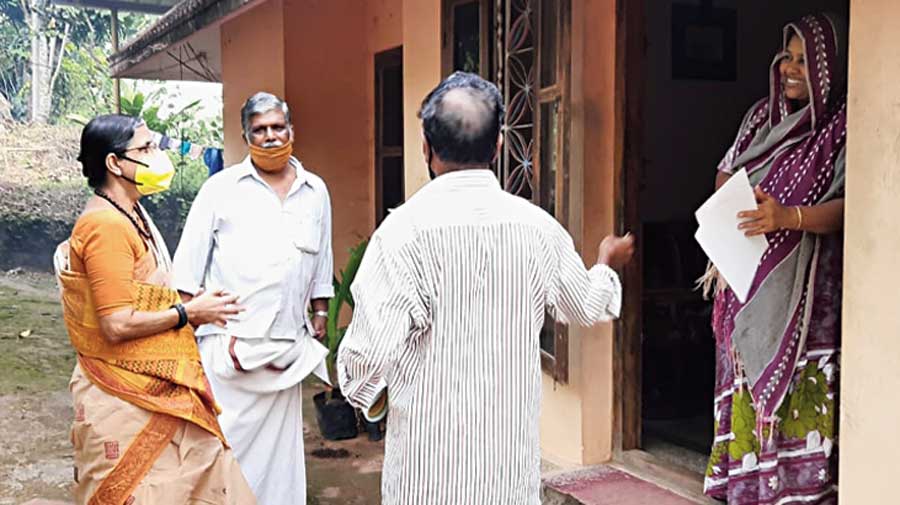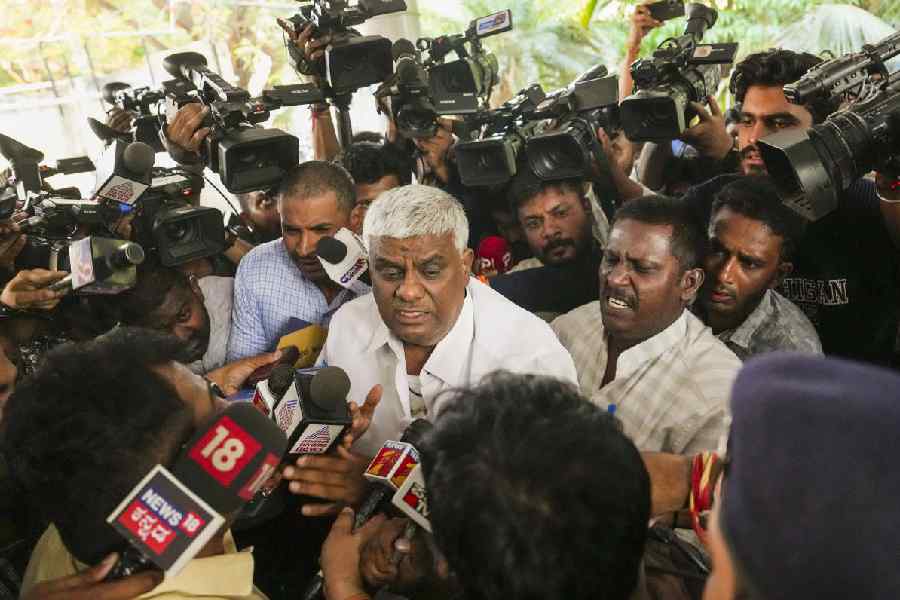If Amit Shah blew the dog whistle in the Hyderabad civic polls by promising to liberate the city from the “Nawab and Nizam culture”, a riposte has been winding its way through the lanes and alleys of a panchayat in the Kerala capital.
“If you want to know my caste and my faith, they are not attached as a tail to my name but they precede my name. It is sakhavu (comrade).”
So goes a voiceover in a 12-second teaser featuring Geetha Nazeer, a CPI member, journalist and author contesting the rural polls in Chemmaruthy, around 40km from the capital city.
The three-phased local body elections this time, scheduled to begin on Tuesday and conclude on December 14, are unlike any the southern state has witnessed so far. The unpredictable factor is the BJP, for which Kerala remains the coveted yet distant final frontier.
“It is going to be a watershed election in Kerala. Since the 1980s, Kerala has had a two-front system, one led by the CPM and the other led by the Congress. After this election, we will know whether this balance of power will be maintained or not. The favourable factor for the BJP is that it is in power in Delhi. It may not have grown to a level sufficient to replace the CPM or the Congress but these elections will show to what extent the BJP has emerged as a force in Kerala,” said B.R.P. Bhaskar, a political commentator and veteran journalist.
“Even if it is a small number, if the BJP is able to break the two-front system, it will change the pattern of the elections in Kerala,” Bhaskar added.
Like in Bengal, the Assembly elections in Kerala are just a few months away. Needless to say, all parties have been accused of playing the communal and caste cards, which have reaped electoral dividends in the state in spite of its progressive record on multiple social indices.
It is against such a backdrop that the unequivocal declaration of Geetha stands out. Unlikely as it may sound, the contest in Chemmaruthy, whose population was put at 32,444 by the 2011 census, has a few “national” elements.
The male voiceover in Geetha’s teaser that gives primacy to political belief over caste and personal faith is borrowed from a 2017 movie, Sakhavu, that sought to shed light on the ideological corrosion in the communist movement.
Kerala, as well as the rest of India, has no dearth of explosive film dialogues but other than chest-thumping slogans dripping ultra-nationalism few make it to the electoral platform. Certainly not those that refuse to milk religious sentiments.
In 2020 — three years after the film was released — the message that teaser and Geetha seek to convey has added significance because of the “Love Jihad” bogey BJP mascot and Uttar Pradesh chief minister Yogi Adityanath has reinjected into the national discourse. It is not accidental that Yogi also blew his version of the dog whistle in Hyderabad by suggesting that the city be renamed Bhagyanagar.
If Geetha’s message is an uncompromising stand against the so-called “Love Jihad”, it resonated in Chemmaruthy for a personal reason, too, although the candidate may never have intended it to be so.
Geetha is the daughter of the late N.E. Balaram, the communist ideologue whose Sanskrit was as impeccable as his knowledge of political theory. She had married Nazeer — son of the late T.A. Majeed, a Muslim minister in the first elected communist government in Kerala — when the contrived phrase “Love Jihad” was non-existent.
Make no mistake. Geetha is not fighting this election as one that pits ideology against religion. Rather, she is fighting for pluralism.
“Whichever caste one belongs, whichever religion one believes in and even for those who do not believe in anything, our Constitution offers protection to all of them. Attempts are now being made to sabotage such a Constitution. We must realise that. We must be aware that they have pushed the country to such a stage that we cannot even choose the food we want to consume,” Geetha told a campaign meeting earlier this week.
Geetha told this reporter later: “Unfortunately, the people who adopted intolerance as a winning strategy are at the seat of power at the Centre. Whoever sows the seeds of hatred and animosity in the minds of the people are an enemy to the nation; the British began it and the BJP is following that strategy.”
Geetha’s contest also has a bearing on another factor in Indian politics: dynasty. She is the daughter of one of the most respected communists in Kerala but no one can accuse her of taking undue advantage of her family ties.
At 64, Geetha is contesting popular elections for the first time. For half-a-century, she played an active role in the party, starting out with student politics and closely associating herself with the women’s wing of the CPI. It is after such life-long contribution in public life that she has chosen to enter power politics, that too from the lowest rung of democracy.
Geetha is well-known in Left circles in Kerala but was unwittingly thrust into the larger limelight a few years ago when she ran into chief minister Pinarayi Vijayan by chance. Vijayan, the Marxist who sports the stern visage of a martinet, broke into an uncharacteristic smile and embraced her. Both hail from Kannur’s Pinarayi village, where the Communist Party’s Kerala unit was born.
In an accidental coincidence, Geetha is running for public office at a time the Left is said to be suffering from the ideological corrosion that the movie, Sakhavu, tried to explore.
In popular perception, the CPM-led government has been dealt blow after staggering blow by a series of controversies, including a smuggling scandal. Ironically, although few administrations in recent memory in Kerala have done so much for the people in such a short time, the Vijayan government is facing daunting headwinds as the Assembly elections approach.
Perhaps keeping in mind the significant presence of minorities in Kerala, the BJP has so far desisted from playing the polarising card as brazenly as Shah and Yogi did in Hyderabad.
The BJP has fielded 105 Muslim candidates in the local body elections, including two women in Malappuram district, a Muslim-majority district and a stronghold of the Indian Union Muslim League (IUML).
Sreeraj Kaimal, a 40-year old first-time BJP candidate, contesting in another panchayat, said: “People have stopped believing the ‘communal party’ label foisted on the BJP by its rivals. There is a strong change in the attitude among Christians. Even if that does not reflect in election results, this is a positive sign for the party.”
However, a voter who spoke to this reporter on condition of anonymity said: “If they don’t have communal agenda, why did they come to a Muslim house like ours and say ‘Don’t think I am a BJP candidate and so you cannot support me’. I felt bad when they spoke to me like that. It is a question of my identity as an Indian citizen.”
Bhaskar, the political commentator, said: “When you look at the electoral history of Kerala, it shows the Left Front always had the upper hand in local body elections. In the Parliament election, most of the time it was the Congress and in Assembly, the alternate system has been in place. But people are also aware that of the three major forces in Kerala, the only party that has the opportunity to wield power at the Centre is the BJP. This is one advantage for the BJP. The other advantage of the BJP is that the good effect of the Kerala renaissance, which made it a progressive state, is wearing thin. So, even if the BJP does not perform well, it will emerge as a balancing power in several villages. Also, the BJP has campaigned very well.”
Nazeem Beegum is an independent journalist based in Thiruvananthapuram, Kerala










